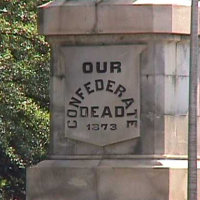Taxpayer Funds Used to Maintain Confederate Graves and Memorials
 (photo: Karen Krugman)
(photo: Karen Krugman)
When President Abraham Lincoln delivered the Gettysburg Address only 19 weeks after that pivotal battle, the graves of the dead were still unmarked, but local officials had already separated them so that Union soldiers—but not the rebels who had killed them—would receive headstones on hallowed ground. Nevertheless, today the federal government spends hundreds of thousands of dollars every year to maintain the graves of those who died trying to destroy the United States by carving a separate nation out of it.
Specifically, the Department of Veterans Affairs, through the National Cemetery Administration, has spent more than $2 million since 2002 to provide more than 18,000 headstones honoring Confederate soldiers, often at the request of local pro-Confederate groups in the South. Although the federal government started providing headstones for veterans under legislation passed shortly after the Civil War, this honor was reserved for those who served in the U.S. military, not for those who fought against it.
That started to change in the early years of the 20th century, shortly after white supremacists across the South had succeeded, after decades of effort, in completely disfranchising blacks and establishing the Jim Crow system of racial oppression. Under the rubric of “national reconciliation,” explains historian William Keylor, “there’s this new mode of American nationalism and patriotism and there’s this emphasis on reunion and reconciliation, and that’s good news for the whites in the South, but bad news for blacks in the South.”
Part of this whites-only reconciliation was a statute passed in 1906 providing headstones for Confederate prisoners of war “who died in Federal prisons and military hospitals in the North and who were buried near their places of confinement,” but which was expanded to include all rebel dead in 1929.
That history is especially relevant today, given that many—perhaps most—of the rebel headstones are ordered by members of “neo-Confederate heritage” groups like the Sons of Confederate Veterans (SCV) and the United Daughters of the Confederacy (UDC). These closely allied organizations regularly publish articles glorifying the Confederacy, including slavery, although they bristle at accusations of racism.
The December 2012 issue of UDC Magazine, for example, featured an article defending the infamous Black Codes, a 2003 article in an official SCV publication defended segregation, and in March 2012 Boyd Cathey, a former member of the SCV executive council, wrote in Confederate Veteran that, “Southerners have understood perforce that the races must live and work side by side, and hopefully harmoniously, but that did not imply legal and social equality for all, either black or white.” Apparently Cathey meant only white southerners.
The issue comes down to this: Should the graves of those who actively committed treason against the United States by taking up arms against it be decorated by the government they tried to overthrow? The federal government does not pay to maintain the memories of Loyalists who fought for the British during the American Revolution, nor for the Irish-Americans who formed St. Patrick’s Battalion to defend Mexico during the Mexican-American War, nor even for John Brown and the men who tried to provoke a slave rebellion and avert a civil war by raiding the federal armory at Harper’s Ferry, Virginia, in 1859. Why the exception for those who supported the most dangerous threat to the United States in its history?
-Matt Bewig
To Learn More:
You Won't Believe What the Government Spends on Confederate Graves (by Steven I. Weiss, The Atlantic)
- Top Stories
- Unusual News
- Where is the Money Going?
- Controversies
- U.S. and the World
- Appointments and Resignations
- Latest News
- Trump Deports JD Vance and His Wife
- Trump Offers to Return Alaska to Russia
- Musk and Trump Fire Members of Congress
- Trump Calls for Violent Street Demonstrations Against Himself
- Trump Changes Name of Republican Party





Comments
moreless